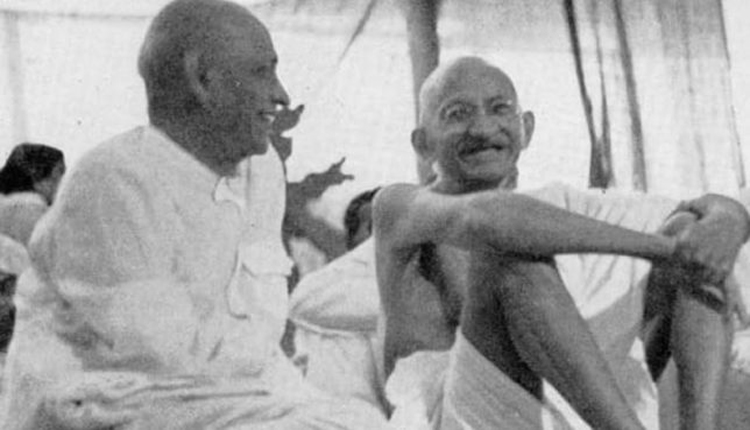Gandhinagar: Over the time, Sardar Vallabhbhai Patel was criticised for the communal bias and pro- Hindu stance. Such accusations are particularly associated with his attitude toward Muslims, even though the fact was that Mahatma Gandhi stressed that it was a mockery of truth to call Patel anti-Muslim. A man with a heart big enough to include all, Patel, he emphasised. Gandhi once said that Patel though looks tough from outside he is a good friend is not afraid of him and though he speaks harsh Patel has a soft corner in his heart.
Relevant issues as well as the Patel’s Frank Approach and Gandhi’s Concerns
“What is wrong in saying that there is only one nationalist Muslim in India and he is Pandit Nehru?” supporting plainly speaking Patel made rather uncomfortable with this comment. This statement soon went viral and at one point it actually made Gandhi uncomfortable; Gandhi actually cautions Patel to let the solutions be guided by wisdom, not by a witty one-liner. This Patel didn’t mince a word, in front of even Gandhi, to say, “Your appeasement of Muslims has made you too meek.”
Patel was quite concrete in his ideas related to Hindu-Muslim amity and was against the simple legal contracts. He is quoted to have said we want the hearts to be united and not the unity that is generated by pieces of paper. At first, Patel did not want partition, and he openly rejected the idea of dividing people on the basis of religions by asking the individuals “how can you divide the waters of a river or a sea”? Where will Muslims go? Their roots are here.”
I am disappointed the Muslim League has risen to professional level
When the Muslim League started growing from the mid 1930s Patel was disappointed by what he considered blind Muslim support for a leader, Jinnah, whom they could not see through. During their imprisonment, Patel once asked Gandhi in a friendly manner: “Who in amongst the Muslims pays heed to you?’ Gandhi replied with the same determination, “It is not important, if not a single Muslim has faith in me; one should still carry some hope.”
The Independent’s media headline of 2003 was “Don’t appease the league, confront it.”
Patel observed correctly that the League’s demands were secessionist and indeed believed that the policy of appeasing the organisation was pointless. Rafique Zakaria in his book-Sardar Patel and the Indian Muslims quoted Gandhi as saying to Patel when the latter refused to lean Urdu, ‘Anyway, sir, at least try to understand the ‘Muslim mind’_and to this Patel responded saying, ‘Sixty-seven years have passed; I am close to my end.’ Another person said that learning Urdu now is too late.” Patel complains that, whereas in the past Sikhs tried to effect rapprochement with Muslims, the resulting perestroika was a greater distance.
A Hindu heart but unconquerable against communal rioters
Partition made many criticise Patel for his attitude for Muslims although this remained speculation due to his support of it. As Patel biographer Rajmohan Gandhi pointed out, Patel had a Hindu heart but he also arrested Hindu or Sikh rioters. However much he disliked the Muslim League and the kind of politics they practised, Patel was emphatic that ‘seven crore Muslims in India must live as free men’.
In a historical meeting held on 16/8/47 Patel, the ever realistic, proposed a planned exchange of population between India and Pakistan suggesting that there is nothing to stop a well worked out exchange of population between the two countries; however the others were not convinced.
The Infamous Lucknow Speech
Patel’s most contentious speeches were physical when on the 6th of January 1948 at the Gwald Parshad ground in Lucknow. During his speech, Patel said, “I say I am a true friend of Muslims, yet they consider me as their arch enemy.” He vowed not to allow the promises of loyalty to work: it was time for genuine loyalty to India. He wanted to know why no one has accused Pakistan for the unprovoked attack on Kashmir that resulted to thousands of deaths the same way they accused the West for terrorism, he said Muslim leaders have to decide which horse to support. This powerful message received different response; Maulana Azad was dissatisfied while Nehru and Gandhi were uncomfortable.
Why Did Patel Say This?
Zakaria pointed out that Patel’s speech was in reply to remarks given by someone in Lucknow in December of 1947 during a massive conference that was convened to promote Muslim unity. This paper finds that some speeches vilified the government’s animus towards Muslims and the English daily, The Statesman publicised it. Patel was desperate to calm down the tensions promoted by cast system, although his action has shown his own impatience with the overall issue, Patel tried to bring some clarity instead of politically correct words.



Comments are closed.